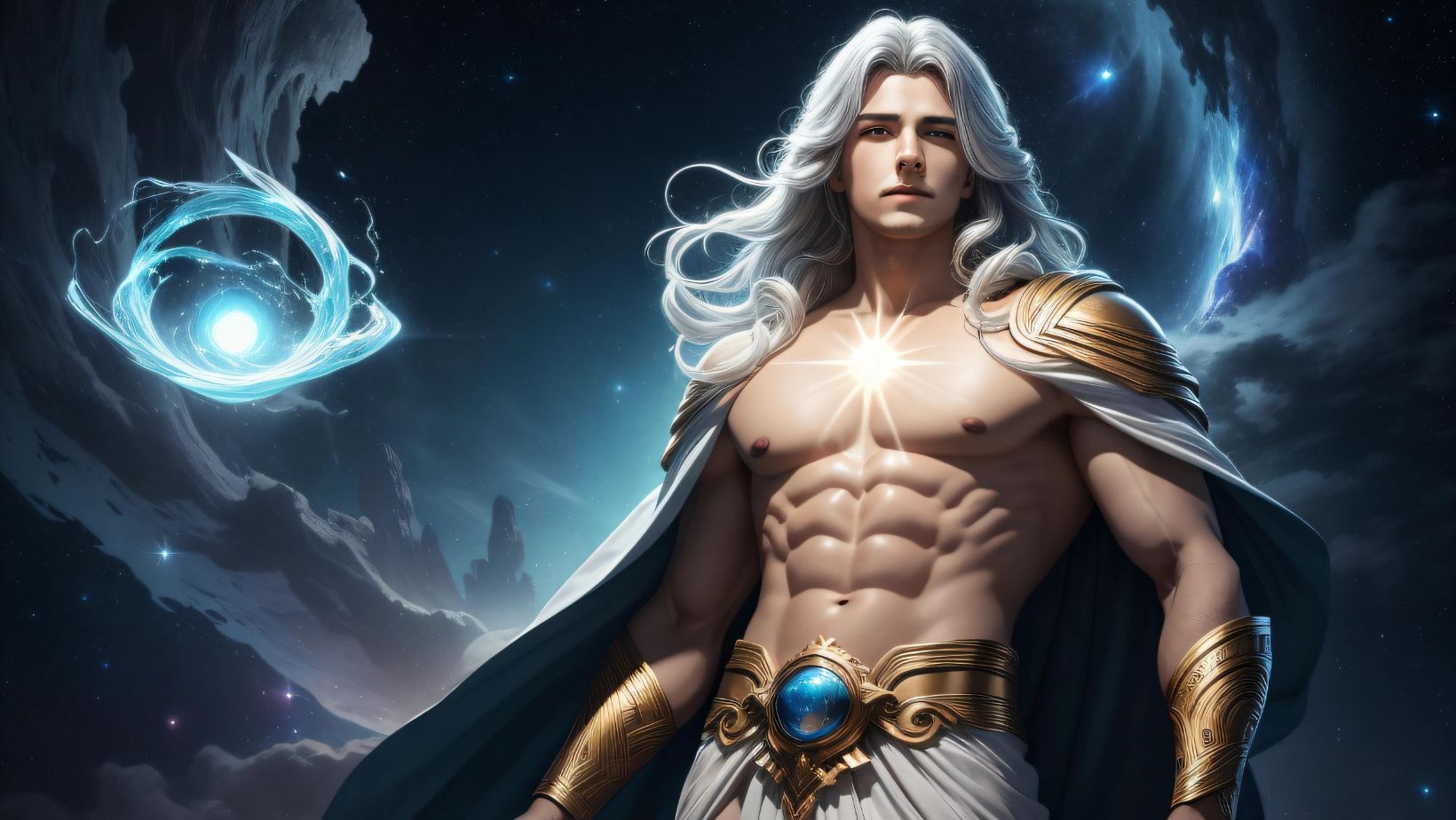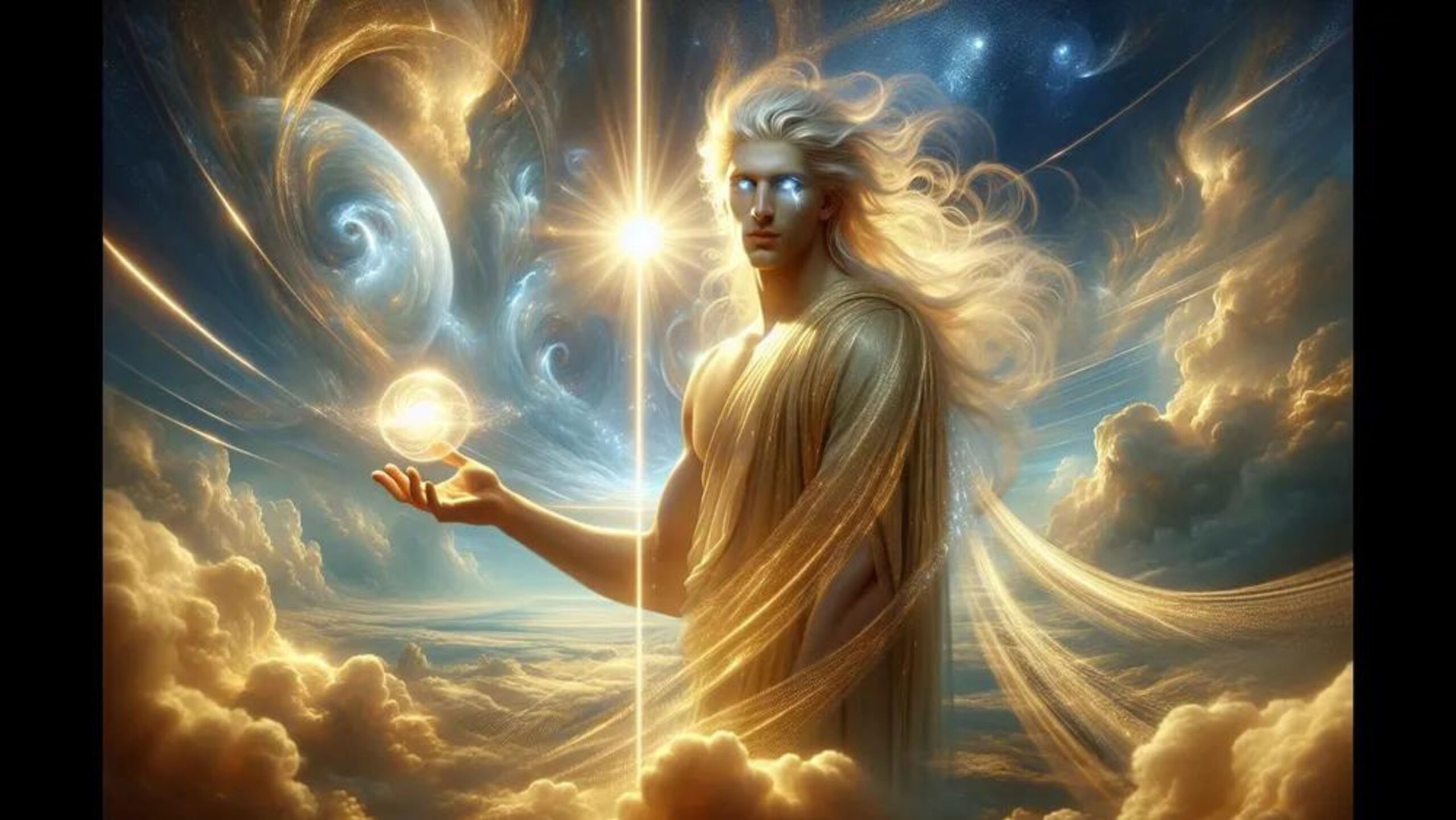Ever wondered about the god who brought light to the world in Greek mythology? Meet Aether Greek Mythology, the primordial deity who personified the bright, pure air breathed by the gods themselves. Born from the cosmic void, Aether played a crucial role in the creation of the universe.
In this post, we’ll take a closer look at Aether’s origins, his family tree, and the impact he had on ancient Greek beliefs. Get ready to be enlightened by the shining presence of this often-overlooked figure in Greek mythology.
Table of Contents:
- Aether – The Primordial God of Light and Upper Air
- Aether’s Family Tree and Notable Offspring
- The Role of Aether in Greek Myths and Legends
- Physical Descriptions and Representations of Aether
- The Significance of Aether in Ancient Greek Culture
- Conclusion
Aether – The Primordial God of Light and Upper Air

In the realm of Greek mythology, Aether was a primordial god who embodied the bright, pure air that only the gods could breathe. He represented the upper sky, untouched by the impurities of the lower atmosphere.
As one of the first primordial deities, Aether played a crucial role in the formation of the universe according to ancient Greek tradition. His domain encompassed the shining light and the clear blue skies that stretched above the clouds.
Aether’s Domain: Aether Greek Mythology
Aether was the god of the upper air, the region above the clouds where the gods resided. The ancient Greeks believed that this celestial realm was filled with a pure, luminous substance called “aether,” which was distinct from the air breathed by mortals.
In Greek mythology, Aether’s domain represented the highest and purest part of the atmosphere. It was a place of divine light and clarity, untouched by the imperfections of the lower world.
Aether and the First Gods
Aether was one of the first primordial gods to emerge at the dawn of creation. According to Hesiod’s Theogony, a key source of ancient Greek mythology, Aether was born from Chaos, the primordial void that existed before the formation of the universe.
Alongside Aether, other primordial deities such as Gaia (Earth), Tartarus (Underworld), and Eros (Love) also came into being. These primordial gods formed the foundation of the Greek pantheon and played crucial roles in shaping the cosmos.
The Fifth Element
In ancient Greek philosophy, Aether was considered the fifth element, existing alongside the four terrestrial elements of earth, air, fire, and water. While the other elements were associated with the material world, Aether was believed to be the divine substance that filled the celestial realms.
The concept of Aether as the fifth element influenced Greek thought and cosmology.
Aether’s Family Tree and Notable Offspring: Aether Greek Mythology
Parents Erebus and Nyx
In Hesiod’s Theogony, Aether is described as the son of Erebus (Darkness) and Nyx (Night). This parentage reflects Aether’s role as the bright light that emerges from the primordial darkness.
Erebus and Nyx were both primordial deities associated with the dark and mysterious aspects of the universe. Their union gave birth to Aether, representing the emergence of light and clarity from the depths of darkness.
Sister Hemera: Aether Greek Mythology
Aether’s sister was Hemera, the primordial goddess of the day. Together, Aether and Hemera were responsible for the cycle of light and darkness that governed the world.
While Aether represented the bright, pure air of the upper atmosphere, Hemera personified the daytime, bringing light and warmth to the earth. Their daily interplay shaped the rhythms of life in ancient Greek mythology.
Offspring
Aether was also known for his notable offspring. According to some myths, he fathered Thalassa, the primordial goddess of the sea. Thalassa represented the vast, shimmering expanse of the ocean, mirroring the luminous qualities of her father’s domain.
Another group of Aether’s offspring were the Nephelae, the rain cloud nymphs. These ethereal beings were associated with the formation and movement of clouds across the sky, bringing moisture and fertility to the earth below.
The Role of Aether in Greek Myths and Legends: Aether Greek Mythology
Creation Myths
In Greek creation myths, Aether played a significant role in the formation of the universe. According to the Orphic tradition, a branch of Greek mythology, Aether was one of the primordial elements that emerged from the cosmic egg at the beginning of time.
The Orphic texts describe how Aether, along with other primordial deities, helped shape the cosmos and establish the order of the universe. His luminous presence filled the upper regions of the newly formed world, separating the heavens from the earth.
Aether’s Presence in the Skies: Aether Greek Mythology
In Greek mythology, Aether was often associated with the clear, bright skies that stretched above the earth. His presence was believed to be visible in the luminous blue of the upper atmosphere, untouched by the impurities of the lower air.
Ancient Greeks looked to the skies and saw Aether’s domain as a representation of divine purity and clarity. The vast expanse of the heavens, with its shimmering light and ethereal beauty, was a testament to Aether’s celestial reign.
Influence on Ancient Greek Beliefs
Aether’s role as a primordial god and the personification of the upper air had a significant influence on ancient Greek beliefs and cosmology. His presence in the pantheon helped shape the Greeks’ understanding of the universe and its divine inhabitants.
The concept of Aether as a pure, luminous substance that filled the heavens became a central tenet of Greek philosophy and science. Thinkers like Aristotle and Plato incorporated Aether into their cosmological theories, exploring its nature and its relationship to the other elements.
Physical Descriptions and Representations of Aether: Aether Greek Mythology
The Solid Dome of the Sky
In ancient Greek cosmology, the sky was often depicted as a solid dome that encircled the earth.
The solid dome of the sky represented the boundary between the earthly realm and the heavenly spheres. Aether’s domain was thought to exist beyond this barrier, in the pure and radiant expanse of the upper atmosphere.
The Bright Blue Ether: Aether Greek Mythology
Aether was often described as the bright, blue substance that filled the upper regions of the sky. This luminous ether was believed to be the purest form of air, untainted by the imperfections of the lower atmosphere.
The ancient Greeks associated the clear, azure skies with Aether’s presence. The vibrant blue hue was seen as a manifestation of his divine essence, permeating the heavens and suffusing the world with its radiant glow.
Aether as a Humanoid God
Although Aether was primarily associated with the luminous upper air, he was sometimes depicted in humanoid form as a deity. In these representations, Aether was portrayed as a majestic and radiant figure, embodying the qualities of light and purity.
Artistic depictions of Aether often showed him as a youthful, ethereal being, with a luminous aura surrounding his form. His presence was meant to evoke the sense of divine clarity and brightness that characterized his domain.
The Significance of Aether in Ancient Greek Culture: Aether Greek Mythology
Aether in Hesiod’s Theogony
Hesiod’s Theogony, a seminal work of ancient Greek literature, played a crucial role in establishing Aether’s significance in the Greek pantheon. In this epic poem, Hesiod recounts the genealogy of the gods and the creation of the universe.
Aether is prominently featured in the Theogony as one of the primordial deities, born from the union of Erebus and Nyx. Hesiod’s account helped solidify Aether’s position as a fundamental figure in Greek mythology, shaping the way ancient Greeks understood the nature of the cosmos.
Aether as the Shining Light: Aether Greek Mythology

For the ancient Greeks, Aether represented the shining light that illuminated the world. His presence in the upper atmosphere was associated with the purity and radiance of the heavens, untouched by the shadows and imperfections of the earthly realm.
The Greeks believed that Aether’s luminous essence permeated the celestial spheres, casting its divine glow upon the earth. This shining light was seen as a symbol of truth, clarity, and divine revelation, guiding mortals towards a higher understanding of the universe.
Aether’s Importance to Ancient Greeks
Aether held a significant place in the religious and philosophical beliefs of ancient Greece. As a primordial god and the personification of the upper air, Aether was revered for his role in the creation and sustenance of the cosmos.
The ancient Greeks saw Aether as a symbol of divine purity and transcendence. His domain represented a realm beyond the confines of the material world, where the gods dwelt in eternal light and wisdom.
Aether’s presence in Greek mythology served as a reminder of the celestial realms that existed above the earth, inspiring mortals to aspire towards divine knowledge and understanding. His significance in ancient Greek culture underscored the enduring fascination with the mysteries of the heavens and the nature of the universe.
Key Takeaway: Aether Greek Mythology
Aether, the primordial god of light and upper air in Greek mythology, represented the pure atmosphere above the clouds. Born from Erebus (Darkness) and Nyx (Night), Aether played a crucial role in creation myths. His domain was associated with divine clarity and influenced ancient Greek beliefs on cosmology.
Conclusion: Aether Greek Mythology
Aether, the primordial god of light and upper air, may not be as well-known as some of his Olympian counterparts, but his role in Greek mythology is no less significant. From his emergence at the dawn of creation to his influence on ancient Greek cosmology, Aether’s presence illuminates the rich tapestry of mythological beliefs.
So the next time you gaze up at a clear, bright sky, remember Aether, the shining deity who breathed life into the heavens. His legacy continues to inspire us, reminding us of the enduring power of light and the boundless wonders of the universe.

